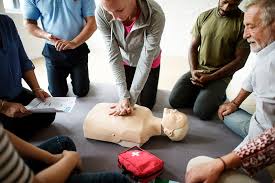Introduction
In today's fast-paced workplace, safety and security is vital. Organizations are increasingly recognizing the value of developing a safe space for employees. Among the most crucial parts of workplace safety training is first help and mouth-to-mouth resuscitation (Cardiopulmonary Resuscitation) programs. These courses not only equip workers with essential life-saving abilities however likewise cultivate a society of safety within the organization. In this short article, we will certainly explore the myriad reasons that work environment security training should consist of first aid and CPR training courses, emphasizing their importance in enhancing office safety.
Why Office Safety Training Need To Include First Aid and Mouth-to-mouth Resuscitation Courses
The assimilation of emergency treatment and mouth-to-mouth resuscitation programs right into office safety and security training has significant advantages. They gear up employees with the understanding and skills necessary to react properly to medical emergency situations, decrease healing time for injured individuals, and potentially save lives. Moreover, having trained workers on-site can instill confidence among employees and reassure them that their well-being is prioritized.
Understanding First Aid
First aid describes the immediate care given to an individual struggling with a small or serious illness or injury up until specialist clinical help arrives. Understanding standard emergency treatment concepts can make a substantial distinction in emergency situations.
Key Elements of First Aid
Assessment: The ability to assess a situation swiftly can assist determine the appropriate actions needed. Stabilization: Comprehending how to support an injured person protects against additional harm. Communication: Efficiently interacting with emergency situation solutions is important for prompt assistance.The Relevance of CPR
CPR is a life-saving method used in emergency situations when someone's heartbeat or breathing has stopped. It entails breast compressions and rescue breaths to preserve blood circulation and oxygenation till professional help arrives.
How CPR Works
- Chest Compressions: These help circulate blood throughout the body. Rescue Breaths: These give oxygen to the lungs.
Benefits of First Aid and Mouth-to-mouth Resuscitation Certification
Obtaining a first aid certificate or completing mouth-to-mouth resuscitation courses features various advantages, both for individuals and organizations.
Enhanced Worker Confidence: Workers feel more protected recognizing they possess life-saving skills. Reduced Healing Time: Quick response with emergency treatment can cause far better outcomes for damaged individuals. Compliance with Regulations: Several industries need qualified personnel as component of their health and safety regulations.Creating a Culture of Safety And Security Via Training
Implementing first aid and CPR training cultivates a society that focuses on worker health.
Encouraging Teamwork
Training sessions frequently include team-building exercises that enhance cooperation amongst employees.
Building Depend on In between Staff members and Management
When administration purchases worker training, it reveals dedication to their wellness, resulting in increased morale.
First Aid Flows vs. Mouth-to-mouth Resuscitation Courses: What's the Difference?
While both kinds of training courses are important, they concentrate on different ability sets.

First Help Courses
These courses cover a large range of subjects past simply cardiac emergencies, consisting of:
- Wound care Burns Choking
CPR Courses
CPR training courses especially focus on techniques connected to cardiac arrest circumstances, highlighting:
- Adult CPR Child/ infant resuscitation Use of an Automated External Defibrillator (AED)
Choosing the Right Training Provider
Not all training suppliers are produced equal; therefore, picking one that fulfills your company's needs is critical.
Accreditation Matters
Ensure that your chosen company offers recognized programs identified by appropriate authorities.
Instructor Experience
Consider instructors' qualifications; knowledgeable trainers commonly offer Sydney CBD First Aid Course Near Me richer learning experiences via real-world examples.

Incorporating First Aid into Workplace Safety And Security Policies
Organizations ought to incorporate emergency treatment requirements into their more comprehensive safety and security policies for detailed coverage.
Regular Training Updates
Conducting regular correspondence course makes certain that understanding continues to be current among employees.
Creating Emergency Feedback Plans
Having clear strategies in position can guide skilled personnel during emergencies.
Legal Ramifications of First Aid Training in the Workplace
Employers have legal responsibilities regarding office security; applying emergency treatment training can aid alleviate risks associated with non-compliance.
Negligence Claims
Failure to give adequate training might leave companies prone to claims if an occurrence takes place due to lack of preparedness.
FAQ Section
What is included in a common emergency treatment course?- A normal emergency treatment course consists of instruction on examining injuries, treating wounds, taking care of burns, dealing with choking incidents, and doing mouth-to-mouth resuscitation if necessary.
- Most CPR programs last in between 4-- 6 hours depending upon whether it's basic or advanced training.
- While not always lawfully mandated, having licensed team member can substantially improve work environment safety and security standards.
- Many approved organizations offer on-line renewal alternatives for first aid certificates which include analyses using video clip conferencing.
- Yes, sectors such as building and construction, health care, education, and production usually have regulative demands requiring qualified personnel on site.
- It's suggested that workers take part in refresher courses every two years or sooner if there are significant changes in procedures or regulations.
Conclusion
To sum up, integrating emergency treatment and CPR right into workplace security training is not just an alternative however a necessity in today's workplace where emergencies can develop anytime. Organizations advantage greatly from having actually trained personnel all set to respond successfully during situations while fostering an atmosphere where staff member health takes priority over all else. For that reason, it comes to be noticeable why work environment safety and security training need to consist of emergency treatment and CPR programs-- they save lives while advertising a positive method toward health and wellness standards within companies throughout different sectors.

By prioritizing such essential training initiatives-- first aid certifications gotten through trusted suppliers along with practical hands-on experience-- business can significantly improve their general emergency situation preparedness degrees while likewise constructing stronger teams efficient in dealing with any type of circumstance head-on!